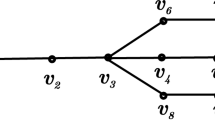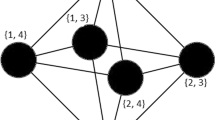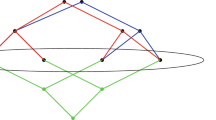Abstract
Let \(\mathcal G\) be an infinite family of connected graphs and let k be a positive integer. We say that k is forcing for \(\mathcal G\) if for all \(G \in \mathcal G\) but finitely many, the following holds. Any \(\{-1,1\}\)-weighing of the edges of G for which all connected subgraphs on k edges are positively weighted implies that G is positively weighted. Otherwise, we say that it is weakly forcing for \(\mathcal G\) if any such weighing implies that the weight of G is bounded from below by a constant. Otherwise we say that k collapses for \(\mathcal G\). We classify k for some of the most prominent classes of graphs, such as all connected graphs, all connected graphs with a given maximum degree and all connected graphs with a given average degree.
Similar content being viewed by others
References
Auletta, V., Caragiannis, I., Ferraioli, D., Galdi, C., Persiano, G.: Minority becomes majority in social networks. In: Markakis, E., Schäfer, G. (eds.) Web and Internet Economics. Lecture Notes in Computer Science, vol. 9470. Springer, Berlin (2015)
Berger, E.: Dynamic monopolies of constant size. J. Comb. Theory Ser. B 83(2), 191–200 (2001)
Broere, I., Hattingh, J., Henning, M.A., McRae, A.: Majority domination in graphs. Discrete Mathematics 138(1), 125–135 (1995)
Caro, Y., Hansberg, A., Montejano, A.: Zero-sum subsequences in bounded-sum \(\{-1,1\}\)-sequences (2016). arXiv:1612.06523
Curtis, E., Ingerman, D., Morrow, J.: Circular planar graphs and resistor networks. Linear Algebra Appl. 283(1–3), 115–150 (1998)
Erdős, P.: Graph theory and probability. Can. J. Math. 11, 34–38 (1959)
Fishburn, P., Hwang, F., Lee, H.: Do local majorities force a global majority? Discrete Math. 61(2), 165–179 (1986)
Füredi, Z., Mubayi, D.: Signed domination in regular graphs and set-systems. J. Comb. Theory Ser. B 76(2), 223–239 (1999)
Peleg, D.: Local majorities, coalitions and monopolies in graphs: a review. Theor. Comput. Sci. 282(2), 231–257 (2002)
Poghosyan, A., Zverovich, V.: Discrepancy and signed domination in graphs and hypergraphs. Discrete Math. 310(15), 2091–2099 (2010)
Truemper, K.: On the delta-wye reduction for planar graphs. J. Graph Theory 13(2), 141–148 (1989)
Woodall, D.: Local and global proportionality. Discrete Math. 102(3), 315–328 (1992)
Xu, B.: On signed edge domination numbers of graphs. Discrete Math. 239(1–3), 179–189 (2001)
Author information
Authors and Affiliations
Corresponding author
Rights and permissions
About this article
Cite this article
Caro, Y., Yuster, R. The Effect of Local Majority on Global Majorityin Connected Graphs. Graphs and Combinatorics 34, 1469–1487 (2018). https://doi.org/10.1007/s00373-018-1938-0
Received:
Revised:
Published:
Issue Date:
DOI: https://doi.org/10.1007/s00373-018-1938-0




